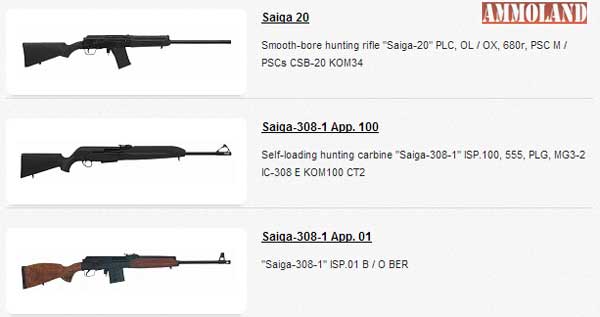

Washington, DC –-(Ammoland.com)- On July 16, 2014, the U.S. Treasury Department’s Office of Foreign Assets Control (OFAC) announced new sanctions on persons and entities in Russia determined to be contributing to the situation in Ukraine (the “Ukraine Sanctions”).
The announcement added four individuals and eleven companies to the list of Specially Designated Nationals pursuant to Executive Order 13662, dated March 20, 2014. Included among the designations is the following firearms manufacturer:
KALASHNIKOV CONCERN (a.k.a. CONCERN KALASHNIKOV; a.k.a. IZHEVSKIY MASHINOSTROITEL’NYI ZAVOD OAO; f.k.a. IZHMASH R&D CENTER; f.k.a. JSC NPO IZHMASH; f.k.a. NPO IZHMASH OAO; a.k.a. OJSC CONCERN KALASHNIKOV; f.k.a. OJSC IZHMASH; f.k.a. SCIENTIFIC PRODUCTION ASSOCIATION IZHMASH JOINT STOCK COMPANY), 3, Derjabin Pr., Izhevsk, Udmurt Republic 426006, Russia; Registration ID 1111832003018 [UKRAINE2].
A link to the full text of the OFAC announcement and the list is here:
https://www.treasury.gov/resource-center/sanctions/OFAC-Enforcement/Pages/20140716.aspx

What is A Specially Designated National?
SDNs include individuals and entities located anywhere in the world that are owned or controlled by, or that act for or on behalf of the government of a sanctioned country. SDNs also include certain individuals and entities designated as terrorists and narcotics traffickers under sanctions programs that are not country-specific. All property and interests in property of a SDN that comes under U.S. jurisdiction is blocked or frozen. Blocking immediately imposes an across-the-board prohibition against transfers or transactions of any kind involving the property. When a corporation, including a bank, blocks a prohibited payment it must report the action to OFAC within 10 days.
The Ukraine Sanctions
In March 2014, President Obama issued Executive Order 13662 blocking property of persons contributing to the situation in the Ukraine. Under the order, U.S. persons may not transfer, pay, export, withdraw, or otherwise deal in blocked property or interests in property. These prohibitions include, but are not limited to “the making of any contribution or provision of funds, goods, or services by, to, or for the benefit of any person whose property and interests in property are blocked,” and “the receipt of any contribution or provision of funds, goods, or services from any such person.” The full text of the Executive Order can be accessed at https://www.treasury.gov/resource-center/sanctions/Programs/Documents/ukraine_eo3.pdf
OFAC Jurisdiction and Penalties
OFAC has sweeping jurisdiction over U.S. persons and persons subject to U.S. jurisdiction. This includes U.S. citizens and permanent resident aliens (“green card” holders) whether in the United States or abroad, companies organized and formed under U.S. law, and any individual or organization physically located in the United States at the time of the activity, regardless of nationality. In addition to these direct controls, OFAC sanctions also prohibit the facilitation of foreign trade with targets of U.S. sanctions. The facilitation prohibitions prevent U.S. persons from undermining sanctions through indirect support and apply to approving, financing, guaranteeing or otherwise assisting foreign trade with a sanctions target, changing policies or procedures to permit foreign affiliates to engage in activities with a sanctions target that previously required U.S. approval, and even referring declined business opportunities to a foreign party.
The penalties for violating OFAC sanctions are substantial. Pursuant to the International Emergency Economic Powers Act (IEEPA), the underlying statute to the Ukraine Sanctions, any person who causes a violation of the sanctions can be held liable for both civil and criminal penalties. Civil penalties can be up to $250,000 per violation or twice the transaction value, whichever is greater. Criminal penalties can be up to $1 million per violation or twice the transaction value, whichever is greater, and up to 20 years imprisonment, or both. In addition, OFAC violations also lead to denial or debarment of export privileges under the International Traffic in Arms Regulations. Voluntary self-disclosures may mitigate the penalties, but we recommend consultation with legal counsel before undertaking such action.
It is important to note that OFAC violations are subject to strict liability. This means that OFAC only has to prove a violation occurred. OFAC does not have to prove the U.S. person intentionally or knowingly violated the sanctions.

Additional Guidance from OFAC
OFAC defines property in sweeping terms to include anything of value. This includes money, checks, drafts, debts, obligations, notes, warehouse receipts, bills of sale, evidences of title, contracts, negotiable instruments, trade acceptance, goods, wares, merchandise, and anything else real, personal or mixed, intellectual property and intangible assets. Property interest is defined as any interest whatsoever, direct or indirect. See OFAC Industry Brochure, “OFAC Regulations for Exporters and Importers” available at https://www.treasury.gov/resource-center/sanctions/Documents/facei.pdf.
OFAC has published two questions and answers to clarify the impact of the sanctions imposed on KC. Below is the full text of the questions and answers, which can also be found here:
374. If I own a Kalashnikov product, is that product blocked by sanctions? Am I able to resell a Kalashnikov product at a gun show or other secondary market?
If a U.S. person is in possession of a Kalashnikov Concern product that was bought and fully paid for prior to the date of designation (i.e., no payment remains due to Kalashnikov Concern), then that product is not blocked and OFAC sanctions would not prohibit the U.S. person from keeping or selling the product in the secondary market, so long as Kalashnikov Concern has no interest in the transaction. New transactions by U.S. persons with Kalashnikov Concern are prohibited, however, and any property in which Kalashnikov Concern has an interest is blocked pursuant to OFAC’s designation of Kalashnikov Concern on July 16, 2014. If a U.S. person has an inventory of Kalashnikov Concern products in which Kalashnikov Concern has an interest (for example, the products are not fully paid for or are being sold on consignment), we advise that U.S. person to contact OFAC for further guidance on handling of the inventory. [7-16-2014]
375. If I have Kalashnikov products in my inventory, can I sell them?
If a U.S. person has an inventory of Kalashnikov Concern products in which Kalashnikov Concern has an interest (for example, the products are not fully paid for or are being sold on consignment), we advise that U.S. person to contact OFAC for further guidance on handling of the inventory. [7-16-2014]
How the Sanctions Affect Firearm Importers and Dealers
Firearms in inventory. According to the OFAC guidance above, if KC has no interest in the firearms, then importers and dealers with KC firearms in inventory may continue to dispose of them. In other words, if there is no payment due to KC for the firearm, then the product is not blocked and U.S. persons are not prohibited from selling the product. Conversely, firearms for which importers and dealers owe KC money are blocked and may not lawfully be transferred. Importers and dealers in this situation should contact OFAC and legal counsel for guidance. OFAC’s contact information is available at https://www.treasury.gov/about/organizational-structure/offices/Pages/Office-of-Foreign-Assets-Control.aspx#fragment-7.
New contracts for purchase of KC firearms. Question #374 makes it clear that U.S. persons are prohibited from negotiating new contracts for the purchase of KC firearms after the sanctions were announced on July 16, 2014. Importers or dealers who have already entered into such contracts should contact OFAC and legal counsel for guidance.
Firearms on order or in the process of shipment or delivery. What is unclear from the FAQs is the effect the sanctions will have on firearms ordered from KC or a third party not yet within the U.S., either because they are en route or because they have not yet been shipped. Importers or dealers in this situation should contact OFAC and legal counsel for guidance.

Administration’s Authority under the Arms Export Control Act
Separate and apart from the sanctions announced by OFAC on July 16, 2014, the President has broad authority under the Arms Export Control Act (AECA) to impose arms embargoes. The President could impose an embargo on the importation of firearms manufactured by KC as a means of implementing the OFAC sanctions. As of the date of this Client Alert, the Bureau of Alcohol, Tobacco, Firearms and Explosives (ATF), the agency responsible for the import provisions of the AECA, has not taken steps to suspend or revoke Form 6 import permits authorizing the importation of KC firearms originating in Russia.
Commerce Department Adds Parties to Entity List
Exporters should also be aware that in conjunction with OFAC’s announcement, the U.S. Department of Commerce’s Bureau of Industry and Security (BIS) has added the eleven companies, including Kalashnikov Concern, to the Entity List. This action is in response to Russia’s continued policy of destabilization in eastern Ukraine and ongoing occupation of Crimea and Sevastopol. BIS has determined the targeted companies are involved or pose a significant risk of becoming involved in activities contrary to the national security and foreign policy interests of the United States.
Designation on the Entity List imposes a license requirement for the export, re-export or foreign transfer of items subject to the Export Administration Regulations to the designated Entities, with a presumption of denial. The list can be accessed at https://www.bis.doc.gov/index.php/policy-guidance/lists-of-parties-of-concern.
For More Information
The above analysis is for informational purposes only and is not intended to be construed or used as legal advice. It does not anticipate all areas in which the proposed revisions could affect a business. Questions about this information can be directed to:
- Johanna Reeves: 202.715.9941 | jreeves@reevesdola.com
- Teresa Ficaretta: 202.715.9183 | tficaretta@reevesdola.com
Receipt of this alert does not establish, in and of itself, an attorney-client relationship.
About Reeves & Dola
Reeves & Dola specializes in helping clients navigate the highly regulated and complex world of manufacturing, sales and international trade of defense and commercial products. With a deep understanding of the Federal regulatory process and expertise working with a variety of Federal agencies, Reeves & Dola assists clients including manufacturers, exporters, importers and dealers of defense articles, government contractors and commercial exporters with all of their transactional and regulatory needs. www.reevesdola.com
